Filter by
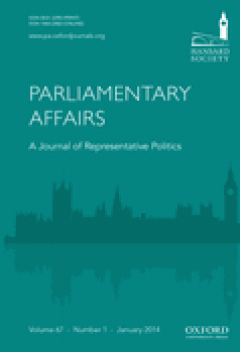
French Election Theory: Why Sarkozy Lost
We review theories of French elections, drawing on a recent general theory developed in our analysis of presidential elections (1988–2007). We offer an explanation for why President Sarkozy was not re-elected in 2012. Two key theoretical variables were involved: one long term—ideological identification—and one short term—economic evaluation. The effect of these variables changed greatly from 20…
- Edition
- Volume 66 Issue 1 January 2013 p. 52-68
- ISBN/ISSN
- 0031-2290
- Collation
- -
- Series Title
- Parliamentary Affairs
- Call Number
- -

A Paradoxical Presidency: Nicolas Sarkozy, 2007–2012
The Sarkozy presidency is shot through with paradox and contrast. Sarkozy was a well-elected president swiftly loathed by most voters; a ‘hyperpresident’ who probably weakened the office; a talented party leader who lost effective control of his party; a right-wing president who was readily compared with Tony Blair; and an ambitious reformer who promised a clean break with the indecision of his…
- Edition
- Volume 66 Issue 1 January 2013 p. 33-51
- ISBN/ISSN
- 0031-2290
- Collation
- -
- Series Title
- Parliamentary Affairs
- Call Number
- -

Politics as Normal? The 2012 French Presidential Election
This article proposes a framework based on three levels of analysis for understanding the 2012 presidential election: the institutional, the partisan and the situational. The 2012 election confirmed the bipolar institutional incentives that structure political competition in the Fifth Republic. The partisan dimension, however, was more fluid than this bipolar reading would lead one to expect. T…
- Edition
- Volume 66 Issue 1 January 2013 p. 17-32
- ISBN/ISSN
- 0031-2290
- Collation
- -
- Series Title
- Parliamentary Affairs
- Call Number
- -

France's Left Turn: Mapping the 2012 Elections
In 2012 the Socialist Party (PS) presidential candidate, François Hollande, defeated the incumbent, Nicolas Sarkozy. The victory was convincing, though not overwhelming. Hollande thus became only the second Socialist president of the Fifth Republic after François Mitterrand. Hollande's success in the presidential contest was reinforced a few weeks later when the PS and immediate allies won an a…
- Edition
- Volume 66 Issue 1 January 2013 p. 1-16
- ISBN/ISSN
- 0031-2290
- Collation
- -
- Series Title
- Parliamentary Affairs
- Call Number
- -

Parliamentary Affairs, Volume 66, Nomor 1 january 2013
- Edition
- -
- ISBN/ISSN
- 0031-2290
- Collation
- -
- Series Title
- -
- Call Number
- -
- Edition
- -
- ISBN/ISSN
- 0031-2290
- Collation
- -
- Series Title
- -
- Call Number
- -

Parliamentary Affairs, Volume 66, Nomor 2 April 2013
- Edition
- -
- ISBN/ISSN
- 0031-2290
- Collation
- -
- Series Title
- -
- Call Number
- -
- Edition
- -
- ISBN/ISSN
- 0031-2290
- Collation
- -
- Series Title
- -
- Call Number
- -
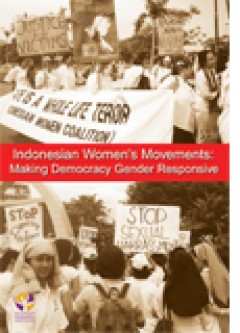
Indonesian Women’s Movements: Making Democracy Gender Responsive
This book is based on Women Research Institute’s study on “Feminist Leadership in the Post Authoritarian Regime in Indonesia: Its Impact on Social Movements and Women’s Welfare” (2012). The goal of the research was to capture the landscape of women’s leadership in Indonesia after the downfall of Suharto in 1998. There were not many studies and analysis on the condition of Indonesian women in t…
- Edition
- 1st ed.
- ISBN/ISSN
- 978-602-9230-03-1
- Collation
- xiii, 192p,; 22 cm
- Series Title
- -
- Call Number
- 305.4 ANA i
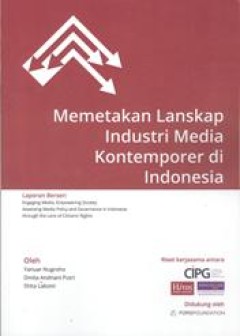
Memetakan Lanskap Industri Media Kontemporer di Indonesia
Buku ini merupakan hasil penelitian yang diterjemahkan dari versi aslinya berbahasa Inggris. Tujuan penelitian ini adalah untuk secara empiris mengkaji dinamika perkembangan industry media di Indonesia dan bagaimana dinamika-dinamika ini mementukan cara masyarakat sipil dan kelompok-kelompok warga Negara menggunakan haknya dalam bermedia. Penelitian ini bertujuan juga untuk memotret lanskap pe…
- Edition
- -
- ISBN/ISSN
- -
- Collation
- xiv, 163p.; 25 cm
- Series Title
- Laporan berseri: Engaging media, empowering society: assesing media policy and governance in Indonesia through the lens of citizens' rights
- Call Number
- 323.44 NUG m

Memetakan Kebijakan Media di Indonesia
Buku ini merupakan hasil penelitian yang diterjemahkan dari versi aslinya berbahasa Inggris. Tujuan penelitian ini adalah untuk menelaah kebijakan media di Indonesia dan mengkaji dampaknya terhadap berbagai bentuk media dan warga negara serta hak-haknya, terutama yang berkaitan dengan hak mereka atas media. Dalam penelitian ini, hak semacam itu mengacu pada hak untuk mengakses media, mengakses…
- Edition
- -
- ISBN/ISSN
- -
- Collation
- xii, 153p.; 25 cm
- Series Title
- Laporan berseri: Engaging media, empowering society: assesing media policy and governance in Indonesia through the lens of citizens' rights
- Call Number
- 323.44 NUG m
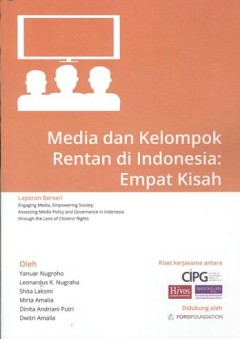
Media dan kelompok Rentan di Indonesia: empat kisah
Buku ini merupakan hasil penelitian yang diterjemahkan dari versi aslinya berbahasa Inggris. Tujuan penelitian ini adalah untuk memetakan (mengkaji) implikasi dinamika ekonomi politik media terhadap hak warga bermedia dilihat dari perspektif warga, terutama kelompok rentan dan dilemahkan. Dengan menyajikan empat studi kasus kelompok rentan, penetian ini bertujuan untuk memetakan gambar yang le…
- Edition
- -
- ISBN/ISSN
- -
- Collation
- xii, 139p.; 25 cm
- Series Title
- Laporan berseri: Engaging media, empowering society: assesing media policy and governance in Indonesia through the lens of citizens' rights
- Call Number
- 323.44 NUG m
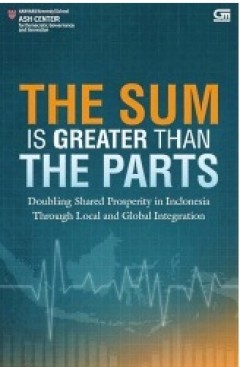
The Sum Is Greater Than The Parts: Doubling Shared Prosperity in Indonesia Th…
The government of Indonesia’s primary development objective is to join the ranks of upper middle-income countries by 2025. If Indonesia could generate an annual real GDP per capita growth rate of 8.5 percent for the next ten years, it would be well on the path to achieving this objective. At current projections, this will not be possible. It will fall short in three fundamental dimensions: grow…
- Edition
- 1st print
- ISBN/ISSN
- 978-979-22-9961-8
- Collation
- 274p.; 23 cm
- Series Title
- -
- Call Number
- 330.959 8 HAR s
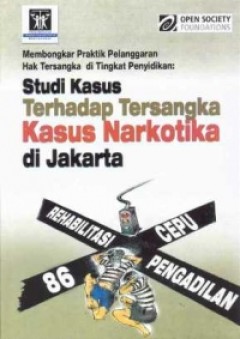
Membongkar Praktik Pelanggaran Hak Tersangka di Tingkat Penyidikan: Studi Kas…
Buku yang anda pegang sekarang memuat laporan dokumentasi yang telah LBH Masyarakat lakukan selama satu tahun sepanjang 2012. Hasil dokumentasi tersebut mangafirmasi cerita - cerita yang sebelumnya pernah kami dengar. Nyaris semua tahanan kasus Narkotika pernah mengalami pelanggaran HAM di tingkat penyidikan, baik upaya paksa yang dilakukan dengan sewenang - wenang oleh pihak kepolisian maupun …
- Edition
- 1st print
- ISBN/ISSN
- 978-979-19579-4-6
- Collation
- viii, 158p.; 21 cm
- Series Title
- -
- Call Number
- 345.056 DHO m

Selusur Kebijakan (minus) Perlindungan Buruh Migran Indonesia
Penelitian yang dilakukan Migrant Care ini melihat seluruh kebijakan yang telah ada mengenai migrasi tenaga kerja sejak masa kolonial hingga tahun 2012, ketika pemerintahan Indonesia telah meratifikasi International Convention on The Protection on The All Rights Migrant Workers and Their Families pada 12 April 2012. Penelitian ini dilakukan untuk mengidentifikasi titik permasalahan dari kebijak…
- Edition
- -
- ISBN/ISSN
- 978-979-19103-2-3
- Collation
- xii, 301p.; 23 cm
- Series Title
- -
- Call Number
- 331.836 HID s
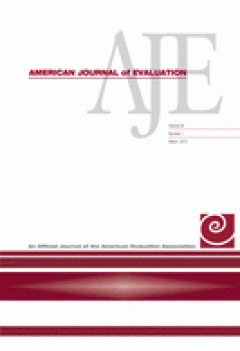
Using the Concept of “Population Dose” in Planning and Evaluating Communi…
When planning and evaluating community-level initiatives focused on policy and environment change, it is useful to have estimates of the impact on behavioral outcomes of particular strategies (e.g., building a new walking trail to promote physical activity). We have created a measure of estimated strategy-level impact—“population dose”—based on our work in evaluating obesity prevention initiati…
- Edition
- Volume 34, Nomor 1, March 2013 p. 71-84
- ISBN/ISSN
- 1098-2140
- Collation
- p. 71-84
- Series Title
- American Journal of Evaluation
- Call Number
- -

You Want Me to Do What? Evaluators and the Pressure to Misrepresent Findings
Evaluators' experiences with being pressured by a key stakeholder to misrepresent findings were investigated in an anonymous survey of a random sample of over 2500 American Evaluation Association members; a response rate of 37% was obtained. Overall, 42% of the respondents had encountered misrepresentation pressure, with 70% of this subgroup having faced it on more than one occasion. Misreprese…
- Edition
- Volume 34, Nomor 1, March 2013 p. 57-70
- ISBN/ISSN
- 1098-2140
- Collation
- p. 57-70
- Series Title
- American Journal of Evaluation
- Call Number
- -

Improving Program Results Through the Use of Predictive Operational Performan…
In Canada, in-depth evaluations of federal programs are intended to occur every 5 years. As such, evaluation is a periodic retrospective (lag) indicator examining results achieved versus program objectives. In a Canadian context, stand-alone evaluations have proved challenging to implement, time consuming, and not well adapted to annual management accountability needs. Consequently, there are i…
- Edition
- Volume 34, Nomor 1, March 2013 p. 45-56
- ISBN/ISSN
- 1098-2140
- Collation
- p. 45-56
- Series Title
- American Journal of Evaluation
- Call Number
- -

The Nature and Frequency of Inclusion of People with Disabilities in Program …
Although evaluation theorists over the last two decades have argued for the importance of including stakeholders from marginalized groups in program planning and research, little is known about the degree of inclusion in program evaluation practice. In particular, we know little about the type and level of inclusion of people with intellectual, developmental, and psychiatric disabilities in the…
- Edition
- Volume 34, Nomor 1, March 2013 p. 23-44
- ISBN/ISSN
- 1098-2140
- Collation
- p. 23-44
- Series Title
- American Journal of Evaluation
- Call Number
- -

Arguments for a Common Set of Principles for Collaborative Inquiry in Evaluation
In this article, we critique two recent theoretical developments about collaborative inquiry in evaluation—using logic models as a means to understand theory, and efforts to compartmentalize versions of collaborative inquiry into discrete genres—as a basis for considering future direction for the field. We argue that collaborative inquiry in evaluation is about relationships between trained eva…
- Edition
- Volume 34, Nomor 1, March 2013 p. 7-22
- ISBN/ISSN
- 1098-2140
- Collation
- p. 7 - 22
- Series Title
- American Journal of Evaluation
- Call Number
- -

Representing People and Representing Places: Community, Continuity and the …
In late 2011 to early 2012 the four UK Boundary Commissions published their provisional recommendations for new parliamentary constituencies. These were produced according to new rules for redistributions legislated in 2011, which make electoral equality the paramount criterion; organic criteria—such as continuity of constituency boundaries and fitting those within the maps of communities rep…
- Edition
- Volume 66 Issue 4 October 2013 p. 856-886
- ISBN/ISSN
- 0031-2290
- Collation
- -
- Series Title
- Parliamentary Affairs
- Call Number
- -

Universal Party Primaries and General Election Outcomes: The Case of Uruguay …
What would happen if all parties competing in the electoral game were forced to hold open, binding, concurrent and obligatory primaries constrained by a ‘Sore Loser Law’? The answer to this question has not been explored, perhaps because there is only one democracy in the world that has applied such rules more than once: Uruguay. This country offers a fertile ground for testing some of the hypo…
- Edition
- Volume 66 Issue 4 October 2013 p. 834-855
- ISBN/ISSN
- 0031-2290
- Collation
- -
- Series Title
- Parliamentary Affairs
- Call Number
- -
 Computer Science, Information & General Works
Computer Science, Information & General Works  Philosophy & Psychology
Philosophy & Psychology  Religion
Religion  Social Sciences
Social Sciences  Language
Language  Pure Science
Pure Science  Applied Sciences
Applied Sciences  Art & Recreation
Art & Recreation  Literature
Literature  History & Geography
History & Geography